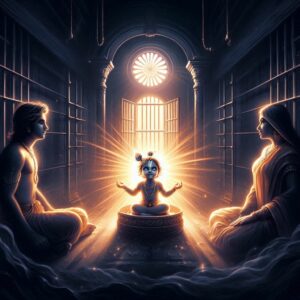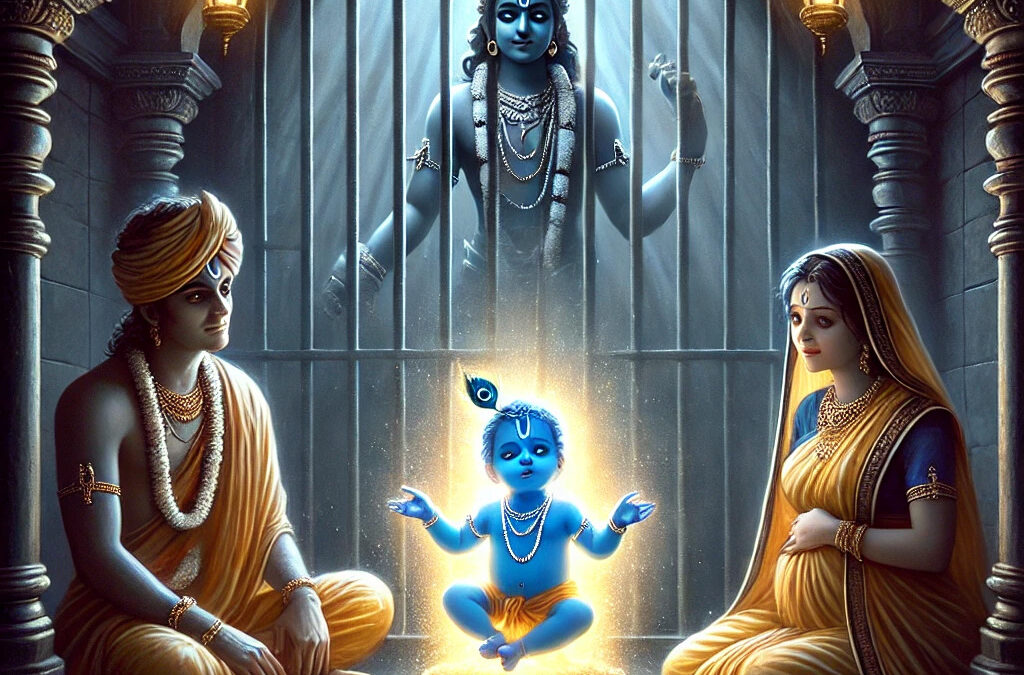Krishna Janmashtami, the significance of Shri Krishna’s divine birth.
Celebrate Krishna Janmashtami with us as we explore the profound significance of Shri Krishna’s divine birth in our latest podcast episode. Discover the spiritual insights behind Krishna’s birth in a prison under the auspicious Rohini Nakshatra, and understand why the Supreme Lord chose such humble beginnings to incarnate. We delve into the symbolism of Kansa, the tyrant who represents ego and fear, and how Krishna’s victory over him signifies the triumph of divine love and truth.
This episode will inspire you to reflect on the prisons within your own mind—attachments, fears, and ignorance—that keep you from realizing your true divine nature. Join us in meditating on Krishna’s birth and embracing the qualities of devotion, faith, and surrender exemplified by His parents, Devaki and Vasudeva. Let Shri Krishna’s divine wisdom and love illuminate your life this Janmashtami. Tune in now and invite the Lord’s grace into your heart. Jai Shri Krishna!
Krishna Janmashtami
On the sacred night of Krishna Janmashtami, the world reverberates with the sweet sound of devotion, the melody of the flute, and the timeless story of Shri Krishna’s divine descent. As the moon reaches its zenith under the Rohini Nakshatra, the constellation associated with beauty, elegance, and nurturing energy, Shri Krishna chose this auspicious moment to incarnate. The Rohini Nakshatra, ruled by the moon, represents the divine motherly love and nurturing qualities, mirroring the nurturing role that Krishna would later play for all of creation. In simple terms, this Nakshatra signifies a time when the cosmos itself was in alignment to welcome the Lord who would embody compassion, love, and the highest wisdom.
Shri Krishna birth in a prison
Shri Krishna’s birth in a prison, rather than a palace, is one of the most profound aspects of his divine play, or Leela. Born to Devaki and Vasudeva in the confines of a dungeon, Krishna’s entry into this world was marked by darkness and oppression. But why would the Supreme Lord, who is the very source of light and joy, choose such a setting for His birth? The symbolism is profound and deeply instructive.
Spiritual significance
A prison is a place of confinement, restriction, and suffering—reflective of the human condition trapped in the cycle of birth and death, bound by ignorance, fear, and attachment. Krishna’s birth in a prison signifies His divine mission to liberate souls from the darkness of ignorance and the bondage of material existence. Just as He emerged from the darkness of the dungeon, He would later bring light into the hearts of all who sought His grace. His birth in a prison instead of a royal palace signifies that true divinity and spiritual liberation do not depend on external wealth or status but on the purity of the heart and the depth of devotion.
His chosen parents, Devaki and Vasudeva, were not only royal but also deeply devout and virtuous. They had undergone severe penances and prayers to be granted the blessing of having the Supreme Lord as their child. Their unwavering faith amidst adversity is a lesson in itself. Devaki, despite being imprisoned by her own brother Kansa, never wavered in her devotion and faith in the divine.
Vasudeva’s determination and strength in fulfilling the divine plan by carrying Krishna across the Yamuna to Gokul shows the unwavering dedication required to walk the spiritual path. Krishna chose these parents not just for their royal lineage, but for their deep devotion, sacrifice, and surrender to the divine will. It shows that God’s grace descends upon those who have pure hearts and steadfast faith, no matter the circumstances they find themselves in.
Kansa Symbolism (Kamsa Symbolism)
Kansa, the tyrannical ruler, represents the ego, fear, and the materialistic forces that dominate and suppress the divine potential within each of us. His fear of being overthrown by Krishna reflects the ego’s fear of losing control and power when faced with the light of divine truth. The lesson here is profound—Kansa’s downfall was not merely at the hands of Krishna but was a result of his own fear and ignorance. His reign of terror represents the darkness that prevails when the ego dominates, leading to suffering and destruction. Krishna’s eventual triumph over Kansa signifies the ultimate victory of divine love, truth, and righteousness over the forces of ego and ignorance.
Krishna’s birth is a call for us to reflect on the prisons we create within our own minds—the chains of attachment, fear, ego, and ignorance that keep us from realizing our true divine nature. Just as Krishna was born to liberate his parents and ultimately the world from Kansa’s tyranny, He comes into our lives to liberate us from the bondage of the ego and the cycle of birth and death.
On this holy occasion of Krishna Janmashtami, let us meditate on the deeper significance of His birth. Let us invite Shri Krishna into our hearts, asking Him to dispel the darkness of ignorance and ego, and to fill our lives with the light of His divine wisdom, love, and joy. Let us strive to embody the qualities of Devaki and Vasudeva—faith, devotion, and surrender—so that we too may be worthy of receiving His grace. And in our daily battles with the Kansa within us, let us remember that with Krishna by our side, victory is assured.
May the divine grace of Shri Krishna guide us, protect us, and lead us on the path of righteousness and eternal bliss. Jai Shri Krishna!
krsnadaasa
(Servant of Krishna)
